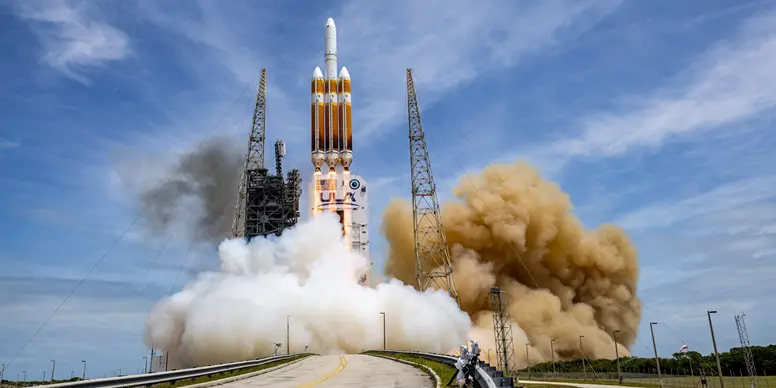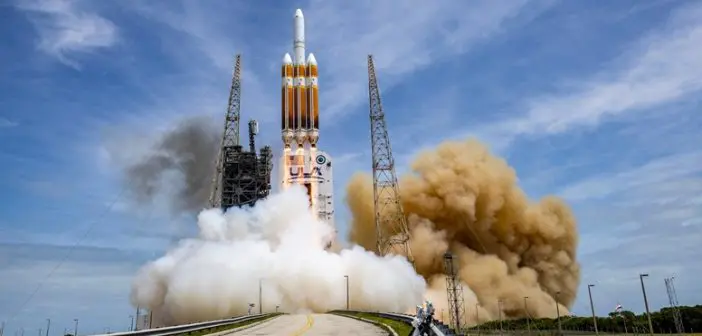
Written by staff writer.
After a two week delay, United Launch Alliance (ULA) conducted its final Delta launch from Cape Canaveral early in the afternoon of April 9 (local time), drawing a line under six decades of operating the versions of the Delta rocket program.
This week’s launch, officially NROL-70, used a Delta IV heavy rocket and took a National Reconnaissance Office (NRO) payload into low Earth orbit. “The Delta rocket played a pivotal role in the evolution of space flight since the 1960s,” said Tory Bruno, ULA’s president and CEO.
United first launched the Delta IV Heavy rocket in 2004. Of its 16 launches, 12 were for the NRO. The first launch, on December 21, 2004, was deemed a partial failure after the three common booster cores cut off early due to cavitation in their oxidizer lines, resulting in the rocket not reaching its planned orbit. However, the remaining launches were successful.
The launches were always a spectacle, with all three Aerojet Rocketdyne liquid-fuel RS-68 rocket engines creating a fireball at lift-off that blackened the boosters and gave the appearance of the rocket catching on fire.
This week, the two boosters were jettisoned four minutes into the flight, with the lift-off weight halving before the three-minute mark and 29 nautical mile level above Earth was reached. By that point, the Delta IV Heavy rocket was travelling at over 9,300 miles per hour. At the 5.40-minute mark, the core booster engine cut off, and the first stage separated. Nearly seven minutes after the launch, coverage ended at the request of the NRO.
The launch was the NRO’s second this year and ULA’s 35th for the government agency. United described their rocket as the NRO’s “workhorse.” Reports indicate that the payload was a large signal intelligence Orion class satellite. While eight have been launched since 1995, their capabilities remain classified.
Speaking at a media event before this week’s launch, ULA CEO Tory Bruno called the Delta IV Heavy rocket “an amazing piece of technology.”
United is replacing the Delta rockets with its next-generation Vulcan rockets. The first of those rockets successfully launched in January, also from Cape Canaveral. Bruno says the Vulcan rockets are less expensive to operate and perform better than the Delta IV Heavy rockets.
The maiden Vulcan flight, which carried two commercial payloads, was the first of two certification flights required for the U.S. Space Force’s certification process. The second is planned over the 2024 Northern Hemisphere summer.
To date, United says it has sold more than 70 Vulcan launches, including 38 missions for Amazon’s Project Kuiper and multiple national security space launch missions. Bruno said Vulcan was designed specifically for national security space missions, which remains the company’s core business. “These are unique missions that require high-end rocket capabilities and very specific orbits,” he said. “Every rocket can do a range of missions, but there is one mission it is best at, and ours is flying NRO missions.”
Image: The final ULA Delta IV Heavy rocket, carrying the NROL-70 mission for the National Reconnaissance Office, lifts off from Space Launch Complex-37 at 12:53 p.m. EDT on April 9. Credit: United Launch Alliance.





